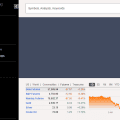For traders and investors, navigating the financial markets is a high-stakes game. Every dollar saved on trading fees and platform subscriptions is a dollar that can compound for a better return on investment. This guide is particularly geared towards those who are penny-wise and profit-focused, helping you uncover the smartest ways to access discounts and coupons for trading platforms.
In this in-depth exploration, we will walk you through a treasure trove of platforms, both lesser-known and popular, that offer various savings opportunities. We’ll cover everything from traditional discount codes to referral programs and even shared insights on the best times to subscribe for exclusive deals.
If you’re ready to stack the odds in your favor and optimize your trading costs, buckle up as we unravel the art of savings in the world of investments.
Table of Contents
Deconstructing Trading Platform Costs
Before we make a sprint for coupons, it’s crucial to understand what costs you are dealing with when trading on various platforms.

They’re More Than Just Commissions
In the financial world, “commission” might sound like the solitary charge you need to factor in, but the expenses are far more diverse:
- Commissions: The fees you pay each time you buy or sell a security. They can be a fixed dollar amount or a percentage of your trade value.
- Spread: This is the difference between the bid (buy) and ask (sell) prices for a currency pair or security.
- Margin Interest: When you borrow money from your broker to buy securities, you owe margin interest.
- Subscription Fees: Many platforms or analytical tools come at a monthly or annual cost.
Unveiling Hidden Charges
Even outside of regular commissions, additional charges might crop up, such as:
- Inactivity Fees: For not meeting a minimum number of trades per quarter or year.
- Wire Transfer Fees: For transferring funds directly to or from your trading account.
- Exchange Fees: Stock exchanges charge fees to access market data and execute trades.
Being aware of all potential costs is the first step to managing them, and ultimately, reducing them.
The Coupon Hunt Begins
With the cost anatomy in mind, we can now start the coupon hunt. Here are several strategies to secure your trading ventures at a discount.

Direct Platform Deal Sections
Some trading platforms have dedicated sections on their websites or apps for deals, where you can find:
- Seasonal Offers: Common during Black Friday, New Year, and other seasonal sales.
- New User Promotions: Created to attract new members, these deals can be irresistible.
- Referral Bonuses: Get your friends on board and be rewarded for it.
General Coupon Websites
Frequent your go-to coupon sites regularly. General coupon aggregators often feature discounts for trading platforms, as well as banner ads with promo codes.
- RetailMeNot: A behemoth in the digital discount domain.
- Honey: A browser plugin that automatically finds and applies promo codes at checkout.
Financial Publisher Partnerships
Numerous financial publishers allocate a portion of their content to ad promotions. Check out investor literature like newsletters, magazines, and market analysis channels for exclusive deals.
Social Media and Online Groups
Join trading and investing online communities where members share tips, including the latest deals and discounts. Facebook groups, subreddits, and Discord servers can be gold mines for this kind of information.
Email Subscriptions
Signing up for email lists of trading services and financial advice websites can give you a heads-up whenever a new deal is launched.
When to Strike for the Best Deals
Timing is everything in the financial markets and it’s just as critical when chasing discounts.

Manufacturer or Billing Cycle Discounts
Sometimes waiting for the right moment in a company’s billing cycle can get you a better deal. For instance, some platforms might offer discounted rates for a two-year subscription if you sign up towards the end of their financial quarter.
Watch Out for Launches and Announcements
Platform launches, new feature releases, or company milestones may come with time-limited promo codes or reduced fees.
Market Leverage
When the market is down, trading platforms may push more aggressively for new users, offering better sign-up deals.
Coupons and Tax Season
Tax season can be another window of opportunity. Some brokers offer tax-saving incentives or may reduce fees to help cushion the blow during the filing period. It’s a good time to look for promotions that could reflect this situation.
The Fine Print Matters
When you discover a discount, don’t just hit “apply” without understanding the terms and conditions. The fine print can impact the real value of the offer, and you want to make sure you’re getting what you think you’re paying for.
- Expiration: Some codes expire in days or weeks; others are valid for months. Act fast if you find a great deal with a short shelf life.
- Minimum Spends and Maximum Discounts: Be aware of any requirements. While some codes offer a flat discount, others may require a minimum spend to activate the savings.
- Eligible Products: Ensure the discount applies to the services or platforms you’re interested in.
- Stacking or Multiple Uses: Can you use the discounts in conjunction with others, or is it a one-off deal?
Trading with Integrity
Finally, remember to approach trading with integrity. Always ensure the coupons and discounts you use are legitimate. Avoid sharing or using counterfeit or expired codes, as there are likely real consequences for such actions.
Ethical Use of Referral Programs
If you’re taking advantage of referral schemes, make sure your recommendations are genuine. It’s not only ethical but also beneficial to all parties involved.
Understanding Loyalty
Loyalty to a particular platform can often result in better negotiation of rates – think of it as the long-term strategy. Platforms value their loyal customers and may provide unique discounts not publicly advertised.
Conclusion
The quest for trading platform discounts is not just about pinching pennies; it’s about understanding the market landscape and strategizing your finances. In the rapidly changing world of trading, securing the best deals can be as rewarding as a well-timed investment. By deploying the tactics outlined in this guide, you’re well on your way to making every trade a cost-efficient one.
Stay sharp, stay diligent, and most importantly, stay savvy. Your trading account – and future self – will thank you.
























